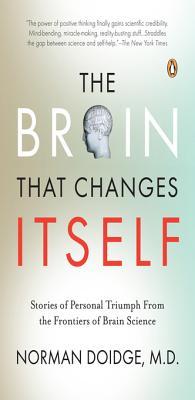
The Brain That Changes Itself
Stories of Personal Triumph from the Frontiers of Brain Science
داستانهای سفر شخصی از مرزهای علم مغز
کتاب های مرتبط
- اطلاعات
- نقد و بررسی
- دیدگاه کاربران
نقد و بررسی

December 4, 2006
For years the doctrine of neuroscientists has been that the brain is a machine: break a part and you lose that function permanently. But more and more evidence is turning up to show that the brain can rewire itself, even in the face of catastrophic trauma: essentially, the functions of the brain can be strengthened just like a weak muscle. Scientists have taught a woman with damaged inner ears, who for five years had had "a sense of perpetual falling," to regain her sense of balance with a sensor on her tongue, and a stroke victim to recover the ability to walk although 97% of the nerves from the cerebral cortex to the spine were destroyed. With detailed case studies reminiscent of Oliver Sachs, combined with extensive interviews with lead researchers, Doidge, a research psychiatrist and psychoanalyst at Columbia and the University of Toronto, slowly turns everything we thought we knew about the brain upside down. He is, perhaps, overenthusiastic about the possibilities, believing that this new science can fix every neurological problem, from learning disabilities to blindness. But Doidge writes interestingly and engagingly about some of the least understood marvels of the brain.

February 15, 2007
The newest buzzword in brain science seems to be "neuroplasticity"the idea that the adult brain is capable of positive change. For decades, scientists and doctors thought little could be done for victims of strokes and accidents because brain cells in adults were locked into specific functions and didn't change or grow. Doidge (psychoanalysis, Columbia Univ. Psychoanalytic Ctr.) tells the story of the scientists whose work has proven that neuroplasticity is, in fact, possible, with examples of patients suffering from strokes, paralysis, obsessive-compulsive disorder, blindness, learning disabilities, and other neurological and psychiatric problems who have been helped. Sharon Begley covers the same ground in her upcoming "Train Your Mind, Change Your Brain: How a New Science Reveals Our Extraordinary Potential To Transform Ourselves", but Begley actually demonstrates how the topic is important to the average person. With stories of those whose lives have been saved or improved through training based on neuroplastic theories, Doidge's book is much more engaging for lay readers. Recommended for most libraries.Mary Ann Hughes, Neill P.L., Pullman, WA
Copyright 2007 Library Journal, LLC Used with permission.

























دیدگاه کاربران